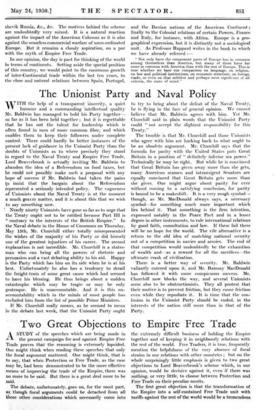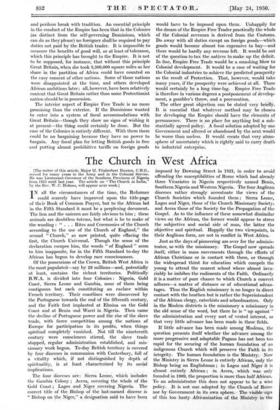Two Great Objections to Empire Free Trade
A STUDY of the speeches which are being made in the present campaign for and against Empire Free Trade proves that- the reasoning is extremely lopsided. One might think when reading these speeches that- only the fiscal argument mattered. One might think, that is to say, that when Protection or Free Trade, as the ease may be, had been demonstrated to be the more effective means of improving the trade of the Empire, there was no more to be said. But there is a great deal more to be said. • The debate, unfortunately, goes on, for the most part, as thoUgh fiscal arguments could be detached from all those other considerations which necessarily come -into- the extremely difficult business of holding the Empire together and of keeping it in neighbourly relations with the rest .of the world. Free Traders, it is true, frequently mention the helpfulness of the very absence of fiscal strains in our relations with other countries ; but on the whole surprisingly little emphasis is' given to two great objections- to Lord Beaverbrook's scheme which, in our opinion, would be decisive against it, even if there was nothing,- or very little, to choose between Protection and Free Trade on their peculiar merits.
The first great objection is that the transformation of the Empire into a- self-contained Free Trade unit with tariffs against the rest of the world would be a tremendous and perilous break with tradition. An essential principle in the conduct of the Empire has been that in the Colonies (as distinct from the self-governing Dominions, which can do as they please) no foreigner shall be required to pay duties not paid-by the British trader. It is impossible, to measure the benefits of good will, or at least of tolerance, which this principle has brought to the Empire. - It is not to be supposed, for instance, that without this principle Great Britain, when she took 3,500,000 square miles as her share in the partition of Africa could have counted on the easy consent of other nations. Some of those nations were disappointed at the time, and others developed African ambitions later ; all, however, have been relatively content that Great Britain rather than some Protectionist nation should be in possession.
The interior aspect of Empire Free Trade is no more promising than the exterior. If the Dominions wanted to enter into a system of fiscal accommodations with Great Britain—though they show no signs of wishing it at present—the thing could certainly be done. But the case of the Colonies is entirely different. With them there could be no bargaining because they have no power to bargain. Any fiscal plan for letting British goods in free and putting almost prohibitive tariffs on foreign goods would have to be imposed upon them. Unhappily for the dream of the Empire Free Trader practically the whole of the Colonial .revenues is derived from the Customs. Do away with all duties except on foreign goods—which goods would become almost too expensive to buy—and there would be hardly any revenue left. It would be out of the_question to tax the natives to make up the deficit. In fine, Empire Free Trade would be a smashing blow to Colonial development. It would be a case of waiting for the Colonial industries to achieve the predicted prosperity as the result of Protection. That, however, would take many years, if the prosperity were achieved at all. There would certainly be a long time-lag. Empire Free Trade is therefore in various degrees a postponement of develop- ment, a gambler's throw, and a provocation.
The other great objection can be stated very briefly. It is essential that whatever method may be chosen for developing the Empire should have the elements of permanence. There is no place for anything but a sub- stantia4 agreed policy. A fiscal solution adopted by one Government and altered or abandoned by the next,would be worse than useless. It would create that very atmo- • sphere of uncertainty which is rightly said to carry death to industrial enterprise.







































 Previous page
Previous page